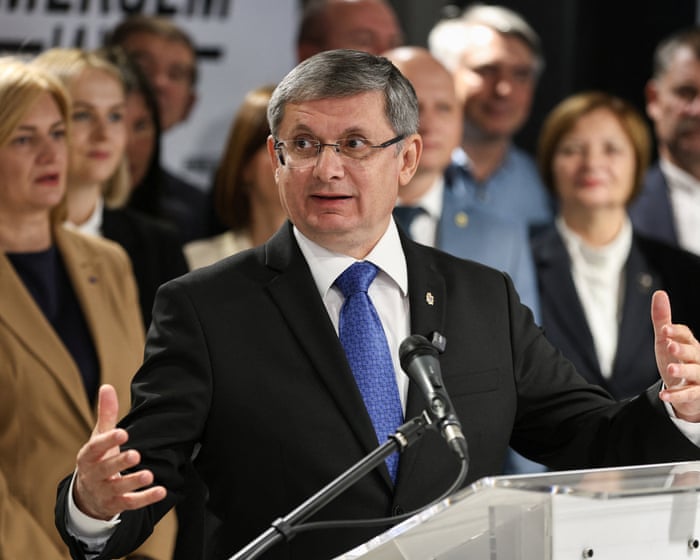Moldova’s pro-European ruling party has maintained its parliamentary majority following a crucial election on Sunday, reinforcing the country’s shift toward the European Union and away from Moscow. With over 99.9% of votes counted, President Maia Sandu’s pro-Western Action and Solidarity Party (PAS) secured 50.03% of the vote, positioning it to win 55 of the 101 parliamentary seats. In contrast, a Moscow-aligned coalition led by former President Igor Dodon, composed of parties nostalgic for the Soviet era, received 24.26%, according to the election commission’s results.
Sandu’s PAS exceeded pre-election polls that had predicted it would remain the largest party but risk losing its majority—a scenario that could have hindered her goal of achieving EU membership within ten years. This outcome represents a major win for Sandu, who has centered her presidency on a pro-European agenda and accused Russia of using unprecedented covert tactics to influence voters in the impoverished nation, which lies between Ukraine and Romania.
In Moldova, power is divided between the directly elected president and a prime minister chosen by parliament, with PAS leader Igor Grosu, a close ally of Sandu, expected to assume the role.
The results will bring relief in Brussels and other European capitals, where concerns had grown that Moscow might regain influence in this strategically important region amid its escalating hybrid campaigns across Europe. European Commission President Ursula von der Leyen posted on X: “Moldova, you’ve done it again. No attempt to sow fear or division could break your resolve.” She added, “You made your choice clear: Europe. Democracy. Freedom. Our door is open. And we will stand with you every step of the way.”
While the election bolsters hopes for Moldova’s EU membership, the path remains uncertain. The country must still implement a series of reforms and resolve the status of Transnistria, a breakaway region where 1,500 Russian troops are stationed.
Other European leaders echoed congratulatory messages. French President Emmanuel Macron wrote on X: “Despite attempts at interference and pressure, the choice of the people of the Republic of Moldova has asserted itself with force. France stands by Moldova in its European project and in its momentum of freedom and sovereignty.”
This year’s parliamentary campaign was marred by allegations of Russian interference. Moldovan authorities accuse Moscow of channeling millions of dollars to pro-Russian parties, organizing vote-buying schemes, and running propaganda to fuel anti-Western sentiment. Two pro-Russian parties were barred from the election due to financing irregularities, a decision that angered the opposition and drew sharp criticism from Moscow.
Polling stations closed after a turbulent day, with officials reporting attempts to disrupt the vote, including cyberattacks on election systems and fake bomb threats at overseas polling locations. Stanislav Secrieru, Sandu’s national adviser, noted on X that Moldovans voted “under massive pressure from Russia and its proxies.”Following the newsletter promotion, Secrieru reported that bomb threats had been made to polling stations in Brussels, Rome, and the US. Moldova’s large diaspora, which generally supports stronger ties with Europe, was anticipated to have a significant impact on the election results.
At the same time, the Kremlin accused Moldova of restricting its citizens’ voting rights in Russia by setting up only three polling stations there, far fewer than in Europe and the US.
Dodon, leader of the Patriotic bloc that opposes Sandu’s pro-European stance, disputed the results, claiming his allies had recorded electoral violations and were gathering proof. He urged opposition parties to participate in a peaceful protest outside parliament on September 29.
Moscow has repeatedly denied allegations of meddling in Moldova, dismissing them as “anti-Russian” and “unfounded.” However, the election outcome is a blow to the Kremlin, which Moldovan officials say devoted unprecedented effort and resources to backing pro-Russian parties.
A Western intelligence official informed the Guardian that in recent months, Moscow had made Moldova its “key foreign policy priority after Ukraine,” pointing out that the Kremlin had reorganized its Moldova team earlier this year to adopt a more assertive approach.
Since becoming independent from the Soviet Union in 1991, Moldova has alternated between forging closer links with Brussels and maintaining Soviet-era connections with Moscow.
Sandu, a former World Bank official, was elected president in 2020 amid strong anti-corruption sentiment. Her administration conducted a referendum last October where Moldovans narrowly voted to make EU membership a constitutional objective. On that same day, Sandu was re-elected president for a four-year term.
She now aims to address her government’s primary weakness: the economy. Inflation remains persistently high, emigration continues unabated, and GDP growth has been limited.
Her supporters contend that these issues are largely due to external factors, such as Russia’s war in Ukraine disrupting trade, causing an energy crisis, and requiring Moldova to host tens of thousands of refugees.
Frequently Asked Questions
Of course Here is a list of FAQs about Moldovas president praising voters for resisting Moscows influence with clear and concise answers
Basic General Questions
1 What is the main news story here
Moldovas President Maia Sandu publicly thanked the countrys voters for rejecting political parties that were aligned with and funded by Moscow which she said were trying to buy votes and influence the election outcome
2 Who is the President of Moldova
The President is Maia Sandu She is a proEuropean leader who has advocated for Moldova to join the European Union
3 What exactly did Moscow do to try and influence voters
According to President Sandu and Moldovan authorities Moscow used tactics like funding proRussian political parties running widespread disinformation campaigns to create fear and social unrest and offering financial incentives to voters
4 Why does Russia want to influence Moldova
Moldova was once part of the Soviet Union and Russia sees it as part of its sphere of influence A proWestern Moldova that joins the EU is viewed by Moscow as a strategic loss and a threat to its regional power
5 What was the event that the president was referring to
She was primarily referring to local elections and a national referendum where voters supported her proEuropean party and its allies over the proRussian opposition
Deeper Advanced Questions
6 What is the broader geopolitical significance of this
This is seen as a significant victory for the West in its strategic competition with Russia It strengthens Moldovas path toward European integration and demonstrates that despite pressure a former Soviet state can resist the Kremlins influence
7 How does this relate to the situation in Ukraine
Moldova like Ukraine is a neighboring country that Russia has tried to keep in its orbit Moldovas success in resisting hybrid warfare tactics provides a case study for other nations facing similar pressure from Moscow
8 What are the Moscowlinked parties in Moldova
The main party often cited is the or Party which was declared unconstitutional by Moldovas Constitutional Court for being financed by Russia Other groups like the Communists and Socialists have also had strong proRussian stances
9 What practical steps has Moldova taken to counter Russian influence
Moldova has expelled Russian diplomats accused of espionage banned Russian



